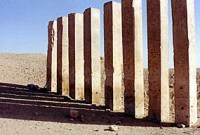Suicide bomber attacks Queen of Sheba temple in Yemen, 9 people killed
A suspected al-Qaida-linked suicide bomber killed nine people including several Spanish tourists in Yemen when he drove his car into the site of Queen of Sheba temple.

Seven of those killed were believed to be Spanish tourists, the officials at Yemen's Interior Ministry said. Three Yemenis, including the suicide bomber, were also were killed, said the officials, who spoke on condition of anonymity because they were not authorized to speak to the media.
Seven other Spanish tourists were wounded in the blast, police said.
Witnesses reported seeing a car enter a gate before exploding at the site of temple, which is known in Yemen by its Arabic name, Balqis. The temple, which is located in the central province of Marib about 140 kilometers (84 miles) east of San`a, was built about 3,000 years ago at the time of the ancient Queen of Sheba.
No one immediately claimed responsibility for the attack, but authorities linked the suicide bomber to al-Qaida. Police said they had received information last month about a possible al-Qaida attack. They did not elaborate.
Less than two weeks ago, the U.S. Embassy warned Americans to avoid the area. On June 23 in the neighboring Shabwa province, a Yemeni guard opened fire on a group of foreign oil workers shortly after they landed at a company airstrip, killing one and wounding five including an American.
The provincial governor said at the time that the guard was mentally ill, but the U.S. Embassy in San'a canceled travel to the two provinces "for the near future" and recommended that Americans avoid the area.
Al-Qaida has an active presence in Yemen, the ancestral home of Osama bin Laden, despite government efforts to fight the terror network. Al-Qaida was blamed for the 2000 bombing of the USS Cole in Aden that killed 17 American sailors and the attack on a French oil tanker that killed one person two years later.
Yemen was a haven for Islamists from across the Arab world during the 1990s, but after the Sept. 11 attacks, it declared support for the U.S. campaign against international terrorism.
But its crackdown on militants has suffered a number of setbacks, such as the February 2006 prison breakout of 23 convicts some of whom had been jailed for al-Qaida-linked crimes.
Foreign interests in Yemen often face low-level threats and foreign tourists are frequently kidnapped by tribes seeking to win concessions from the government, either better services or the release of jailed relatives. Most of the hostages have been released unharmed.
Subscribe to Pravda.Ru Telegram channel, Facebook, RSS!





